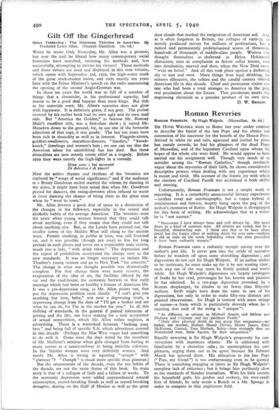Gilt Off the Gingerbread
Since Yesterday : The Nineteen Thirties in America. By Frederick Lewis Allen. (Hamish Hamilton. I2S. 6d.)
WHEN he wrote Only Yesterday, Mr. Allen was a pioneer, but over the trail he blazed how many contemporary social historians have marched, imitating his methods and, less successfully, attempting to imitate his virtues! Those methods and those virtues are used and displayed in this new volume, which opens with September 3rd, 1929, the high-water mark of the great stock-market boom, and ends exactly ten years later with the Prime Minister's speech on the radio announcing the opening of the second Anglo-German war.
In those ten years the world was so full of a number of things that a chronicler, in his professional capacity, had reason to be a good deal happier than most kings. But rich as his materials were, Mr. Allen's narrative does not glow with happiness. It is definitely grave, if not grey. The period covered by his earlier book had its own ugly and its own mad side. But "America the Golden," to borrow Mr. Ramsay Muir's excellent title, was a first-class show ; it suited Mr. Mencken down to the ground, for, to use one of the favourite adjectives of that sage, it was gaudy. The last ten years have been rich in absurdity as well as in interest. Flagpole-sitters, goldfish-swallowers, marathon-dancers, " handies," " knock- knock," jitterbugs and women's hats ; no one can say that the American talent for uninhibited fun has died. But these absurdities are now merely comic relief in a tragedy. Before 1929 they were merely the high-lights in a comedy.
DOW sono i bei momenti Di dolcezza e di piacer?
Now the artless rhymes and rhythms of the 'twenties are replaced by " songs of social significance," and if the audience at a Benny Goodman recital startled the solemn by dancing in the aisles, it might have been noted that when Mr. Goodman played for dancers, the swing-devotees often refused to waste in mere dancing the chance of being close to the great man when he " went to town."
Mr. Allen devotes a good deal of space to a discussion of the changes in the folkways, especially in the sexual and alcoholic habits of the average American. The 'twenties were the years when young women learned that they could talk about anything, even if they meant that they could not talk about anything else. But, as the Lynds have pointed out, the smaller towns of the Middle West still clung to the ancient ways. Female smoking, in public at least, was still frowned on, and it was possible (though not easy) to live for long periods in such places and never see a respectable male citizen, much less a lady, " with drink taken." The depression and the repeal of prohibition accelerated the change over to the new standards. It was no longer necessary to imitate Mr. Thurber's young women and go to New York " for concerts." The change in what was thought possible was dramatically complete. For that change there were many reasons, the evaporation of the idea of sin, the facilities offered by the car and the road-house, the economic barriers to that early marriage which had been so healthy a feature of American life. It was a pre-depression song, as Mr. Allen points out, that put the depression problem most clearly. " I can't give you anything but love, baby," was now a depressing truth, a depressing change from the days of " I'll get a broker and see what he can do, for I'm in the market for you." In all this shifting of standards, in the general if pained toleration of petting and the like, one force making for a new acceptance of sexual competition, which Mr. Allen rather neglects, is advertising. There is a watershed between looking your best " and being full of specific S.A. which advertisers crossed in this decade. (Perhaps the Mae West vogue had something to do with it. Gone were the days noted by the members of Mr. Mulliner's seminar when girls changed from having as many curves as a scenic-railway to being invisible sideways. In the 'thirties women were very definitely women. And surely Mr. Allen is wrong in equating " oomph " with " glamour "? " Oomph " is much more specific than glamour.) But the amusements of the decade, even the sex habits of the decade, are not the main theme of this book. Its main story is that of a collapse of faith and a failure of works. To the economic depression were added unprecedented natural catastrophes, record-breaking floods as well as record-breaking droughts, skating on the Gulf of Mexico as well as the great
dust clouds that marked the emigration of American soil. And, as is often forgotten in Britain, the collapse of 1929-33 not merely produced misery for millions of proletarians, but it ruined and permanently proletarianised scores of thousands, hundreds of thousands of middle-class people. Women w ho thought themselves as sheltered as Helen Hokinson's characters, men as complacent as Arrow collar heroes, sank into destitution, starved and then, when the New Deal came, " went on belief." And all this took place against a darkening sky to east and west. More things than legal drinking, the scissors silhouette, the talkies and the candid camera entered American life in this decade. Chief and permanent visitor was one who had been a total stranger to America in the past, real pessimism about the future. That pessimism marks this engrossing chronicle as a genuine product of its own time,
D. W. BROGAN.














































 Previous page
Previous page